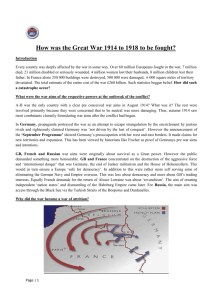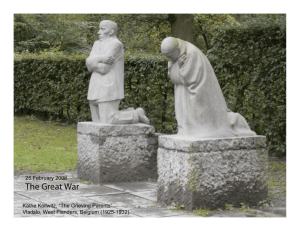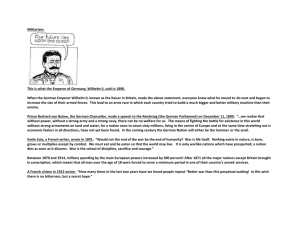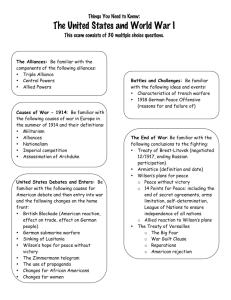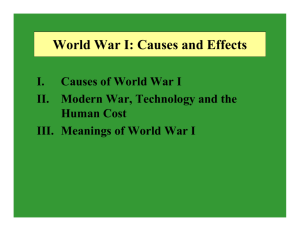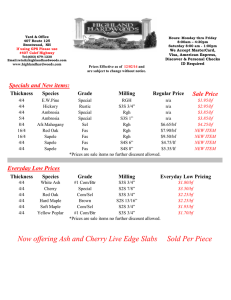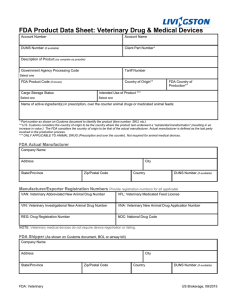World War I - Brookdale Community College
advertisement
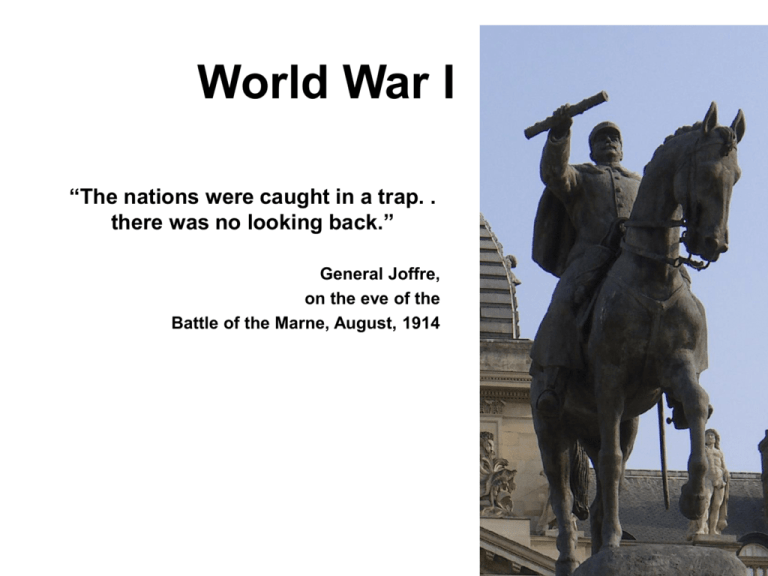
World War I “The nations were caught in a trap. . there was no looking back.” General Joffre, on the eve of the Battle of the Marne, August, 1914 How was Europe in 1900 like the Titanic? “La belle epoque” War is Impossible "Nothing could have been more obvious to the people of the early twentieth century than the rapidity with which war was becoming impossible. And as certainly they did not see it. They did not see it until the atomic bombs burst in their fumbling hands." H G Wells, The World Set Free, 1914 First World War.com: http://www.firstworldwar.com/index.htm BBC: http://www.bbc.co.uk/history/war/wwone/ Britain and France - Europe’s liberal powers “What spoiled children we are” Germany and Italy - The new nations “We demand our place in the sun” Austria and Russia - Dying dynasties “Hard times make for hard lines” Central Europe - The Balkan “tinderbox” “We wanna be free!” The World United States - New great power of the West China - self-strengthening that failed, revolution Japan - the new great power in the East India - England’s “jewel in the crown” Latin America - Political Independence, economic dependence Africa - Partition and resistance Middle East - Ottoman decline, “the sick man” “Deep, Underlying Developments” • • • • Imperialism Economic Competition Nationalism Militarism – the Schlieffen Plan, 1905 Standing armies • Alliances – Triple Alliance – Germany, Austria-Hungary, Italy – Triple Entente – France, England, Russia • Role of Public Opinion – “War Fever” World War I Alliance System Central Powers Triple Entente WAR FEVER NOTED WRITERS AND THINKERS ADVOCATED WAR William James (American) “The plain truth is that people want war” (1912) Winston Churchill (British) “. . .in the field of battle life is at its best and healthiest while one awaits the caprice of the bullet.” (1900) von Treitschke (German) “War, with all its bruitality and sterness, weaves a bond of love between man and man, linking them together to face death, creating a bond that will last forever. He who knows history knows also that to banish war from the world would be to mutilate human nature.” Schiller (German) Man is stunted by peaceful days, In idle repose his courage dercays. . . But in war man’s strength is seen, War enobles all that is mean. Belloc (British) “How I long for the Great War. It will sweep Europe clean like a broom!” Stravinsky (Russian) “War is necessary for human progress.” (1907) Holmes (American) “. . .man’s warlike nature and his destiny is battle. Civilization has not changed human nature. . .armed strife will not disappear from the earth until human nature changes.” (1895) Driant (member of the French assembly) “the outcome of the next war will be decided in less than a month.” (1906) Battle of the Marne, August 1914 “The Lamps are going out all over Europe. We shall not see them lit again in our lifetime.” Sir Edward Grey, August 1914. (RGH # 62, p. 258) TOTAL WAR – “the killing machine” Unrestrained, mass warfare because whole nations were fighting for their national survival. Need to draft huge numbers of citizens and to organize the rest for war-related work. Blurring of distinctions between the battlefront and the homefront. Efficient mobilization of vast amounts of human and material resources began to eclipse tactical brilliance and courage. Science was mobilized to develop more deadly weapons to break the stalemate. Homefront attacks, espionage, propaganda, restricting civil liberties in the name of national survival. Sacrifices from civilians through rationing, bond drives, blood donations, civilian defense. Masters of War Bob Dylan You might that I'm young Come yousay masters of war You fasten the triggers You say I'm unlearned Youmight that build all the guns For the others to fire But onethe thing I know Youthere's that build death planes Then you set back and watch Though younger than you You thatI'm build the big bombs When the death count gets Even Jesus would never You that hide behind wallshigher You inhide your mansion Forgive you do desks Youhide thatwhat behind AsI just young people's want you to blood know Flows out of their bodies Let mesee askthrough you oneyour question I can mask And is buried in the mud Is your money that good Will buynever you forgiveness Youitthat done nothin' You've thrown the worst fear Do think that it could Butyou build to destroy That can ever bemy hurled I You think you will find play with world Fear to bring children When your death Like it's your littletakes toy its toll Into the world All the money made You put a gunyou in my hand For threatening my baby Will buy from back my your soul Andnever you hide eyes Unborn and unnamed And you turn and run farther You ain't worth blood And I hope thatthe you diefly When the fast bullets That runs in your veins And your death'll come soon I Like will follow Judas your of oldcasket How much do I know In thelie pale You andafternoon deceive To of can turn And I'llout watch while Atalk world war beyou're won lowered Down to your You want me deathbed to believe And stand o'er your But I'll I see through yourgrave eyes 'Til I'mI see surethrough that you're And yourdead brain Like I see through the water That runs down my drain “Mutual Butchery” Stalemate – War of Attrition (See RGH #62, p. 258-259) Why were there NO victories in World War I? Machine Gun Trenches “No Man’s Land” Barbed Wire Poison Gas Advantage to the Defense German trenches, 1917 TRENCHES – 400 MILE LINE FROM NORTH SEA TO SWITZERLAND From All Quiet on the Western Front, (RGH #63, pp. 261-266) “In himself, man is essentially a beast, only he butters it over like a slice of bread with a little decorum.” “There is no escape anywhere. . .I open my eyes—my fingers grasp a sleeve, an arm. . .a dead man.” “We have all lost feeling for each other. . .we are insensible, dead men, who through some trick, some dreadful magic, are still able to run and to kill. . .” “I am young, I am 20 years old; yet I know nothing of life but despair, death, fear, and fatuous superficiality cast over an abyss of sorrow.” “Our knowledge of life is limited to death. What will happen afterwards? And what shall come out of us?” The War Sonnets: V. The Soldier Rupert Brooke, d. 1915 If I should die, think only this of me: That there's some corner of a foreign field That is for ever England. There shall be In that rich earth a richer dust concealed; A dust whom England bore, shaped, made aware, Gave, once, her flowers to love, her ways to roam, A body of England's, breathing English air, Washed by the rivers, blest by suns of home. And think, this heart, all evil shed away, A pulse in the eternal mind, no less Gives somewhere back the thoughts by England given; Her sights and sounds; dreams happy as her day; And laughter, learnt of friends; and gentleness, In hearts at peace, under an English heaven. Anthem for Doomed Youth Wilfred Owen, d. Nov. 4, 1918 What passing-bells for these who die as cattle? Only the monstrous anger of the guns. Only the stuttering rifles' rapid rattle Can patter out their hasty orisons. No mockeries for them; no prayers nor bells, Nor any voice of mourning save the choirs, -- The shrill, demented choirs of wailing shells; And bugles calling for them from sad shires. What candles may be held to speed them all? Not in the hands of boys, but in their eyes Shall shine the holy glimmers of goodbyes. The pallor of girls' brows shall be their pall; Their flowers the tenderness of patient minds, And each slow dusk a drawing-down of blinds. Children's Crusade Sting, Dream of the Blue Turtles, 1984 Corpulent generals safe behind lines Younglessons men, soldiers, nineteen fourteen History's drowned in red wine Marchingfor through they'd never seen Poppies young countries men, death's bitter trade rifles, game of charades All ofVirgins those with young livesa betrayed All for a children's All for a children's crusade crusade Pawns in theofgame are not victims chance The children England would neverofbe slaves Strewntrapped on the fields Belgium and France They're on theof wire and dying in waves Poppies for young men, death's bitter trade The flower of England face down in the mud All of in these youngof lives betrayed And stained the blood a whole generation The children of England would never Midnight in Soho nineteen eighty fourbe slaves They're on the wireslaves and dying in waves Fixing intrapped doorways, opium The flower of England the mud Poppies for young men,face suchdown bitterintrade And in the blood of a whole generation All ofstained those young lives betrayed All for a children's crusade IMPACT OF WORLD WAR I [John Lukacs—“The Short Century”—1914-1989 (or 1991)] Military Technology—machine gun, barbed wire, gas, flame thrower, tank, airplane, submarine The end of courage—trench warfare, massed assaults, artillery, attrition—Verdun, Somme Total war—civilians’ role (background for totalitarianism) Fear of total war in post-war era—disarmament and appeasement World War I and World War II—cause and effect? Political – A New World Order Old states and New states End of four empires: German, Russian, Austrian and Ottoman New states: Finland, Latvia, Lithuania, Estonia, Poland, Czechoslovakia, Yugoslavia, Austria, Hungary German and Russian losses (Nazi-Soviet pact, 1939) and appeasement Russian revolution—Lenin and the party state (beginning of Cold War?) --the ideologically based state The Middle East: New countries—Iraq, Syria, Palestine-Jordan Within states Political centralization—suspension of democracy Propaganda—dehumanization of the enemy End of aristocracy—many died in war Democracy to dictatorship in 20’s and 30’s (Estonia, Latvia, Lithuania, Poland, Austria, Yugoslavia, Spain, Italy, Germany) Appeal of ideologies—Koestler and conversion to communism Genocide—Turkey and the Armenians Economic Economic regimentation during the war—“war socialism” and the growth of government Break up of empires causes economic chaos German reparations and allied war debts USA: debtor to creditor contributes to the depression International law, etc. Treaty of Versailles Idea of an international forum—League of Nations, UN Idea of arms control—Washington Naval Conference, etc. U.S. emerges as a reluctant world power—Wilson—self-determination USSR—Lenin and global ambitions Revolt against Europe—decline of imperialism (eg. of India) Cultural (See RGH #65) End of Enlightenment values—irrationalism (Nietzsche, Bergson, Freud) “Age of Anxiety”—Eliot, Yeats, y Gasset, Sartre and existentialism Art—Dada, Surrealism, Futurism, abstract expressionism, etc. Literature—war novels, the “Lost Generation,” Kafka History—Spengler Religion—original sin—Barth Psychology—Human nature (Inge); behaviorism, instinctualism Science—the end of exact science: Planck, Heisenberg
